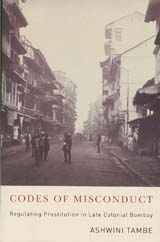-
The expansion of the sex trade in many countries is evidence to ineffectual laws that seek to regulate or curb the industry. By questioning the notion of lawmaking as an effective instrument of socio-economic and political reform, Ashwini Tambe's Codes of Misconduct provides a discerning alternate reading of imperial laws and policies regarding prostitution in colonial Bombay. Tambe's analysis of the ways in which British colonial administrators introduced and reworked a series of laws pertaining to prostitution provides a detailed account of how lawmaking during this period nurtured specific forms of prostitution, whilst concurrently increasing the coercion of prostitutes. Despite Victorian morals that deemed prostitution as depraved and perverse, the colonial administrators deviated from their ideological convictions and institutionalised a practice shaped by the state's 'pornographic imagination' (p. xxiv).
-
By focusing on the micropractices of regulation, Tambe reveals an enlightening perspective on state-based violence against Indian prostitutes that was imposed by the police, public health officials and military administrators, based on a review of police files, prison records, and census data over a period of eighty years. In early Bombay, Tambe suggests that prostitution was regarded as a form of public disturbance and it was not until the introduction of the Contagious Disease Acts (CDA) that colonial law aimed to control all women in prostitution. The CDA made it compulsory for women to be registered and monitored for diseases, in particular venereal disease. Due to the rising incidence of venereal disease among soldiers, prostitutes were viewed in ways that medicalised women's sexuality; many prostitutes were forced to endure painful medical examinations. Although Tambe views the CDA as failing to regulate prostitution, she argues that the Act did allocate spaces for prostitution along racial lines. Tambe's comprehensive examination of the European prostitute in Bombay and anti-trafficking discourse highlights the racially stratified sexual order that existed during this period.
-
Tambe's elucidation of European prostitutes working in Bombay during this period provides a fascinating insight into the women's complex and insecure lives that were manipulated by brothel mistresses, pimps, clients and the police. Although European prostitutes were subjected to disciplining and surveillance, Tambe's reading of police files highlights that some European prostitutes and mistresses were quite successful and well established as a result of their earnings. Due to the women's prosperity, Bombay police excluded them from the discourse of trafficking within the political context of Bombay. Tambe contends that the colonial state viewed prostitution in Bombay as a racially segregated practice, given that Indian prostitutes came under the purview of the social reform agenda and European prostitutes were monitored by European police officers.
-
In a detailed account of an Indian brothel worker's murder by brothel keepers, Tambe illustrates the colonial state's disregard in relation to protecting Indian prostitutes from violence. The details of the murder created social aversion toward the existence of brothels yet, as Tambe shows, did not influence positive or effective legislative change. The moral panic influenced the development of abolitionist laws, which sought to remove prostitution from public view. Despite the illegalisation of brothels, prostitution continued and the conditions and behaviour of brothel keepers did not change. As Tambe highlights throughout the book, laws were not devised with a consideration of how they might be enforced practically.
-
Tambe's Codes of Misconduct provides a cautionary viewpoint of using law as a means of social and political reform, based on a detailed analysis of the history of prostitution in colonial Bombay. The book provides a diverse insight into prostitution during the colonial period in Bombay by challenging and deconstructing established discourses, which continue to shape socio-economic and political understandings regarding the plight of sex workers in contemporary Mumbai society.
|



